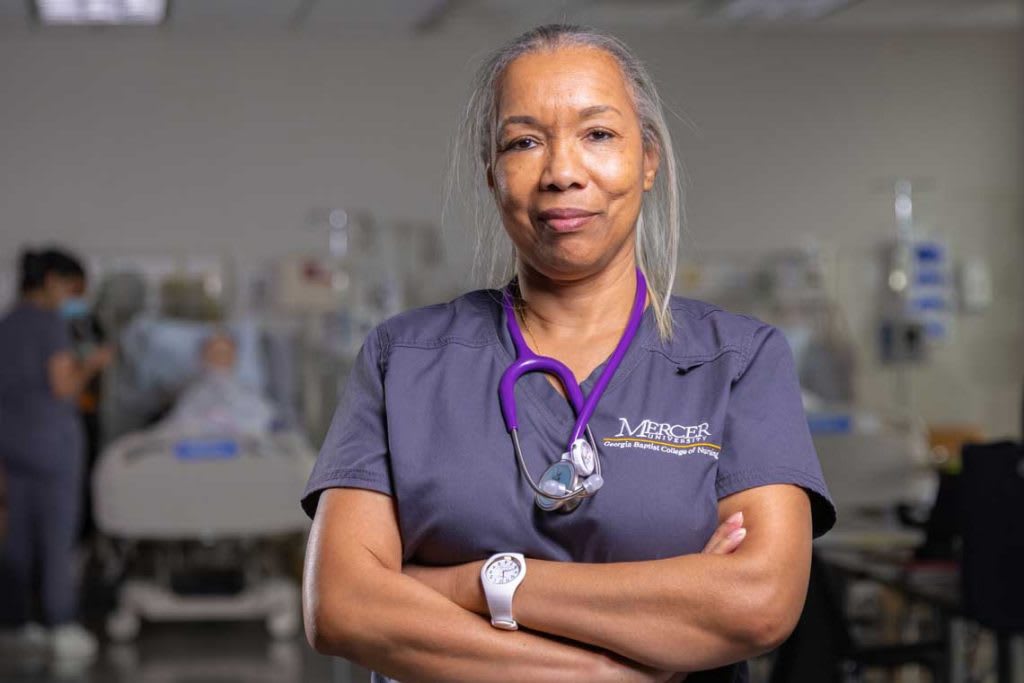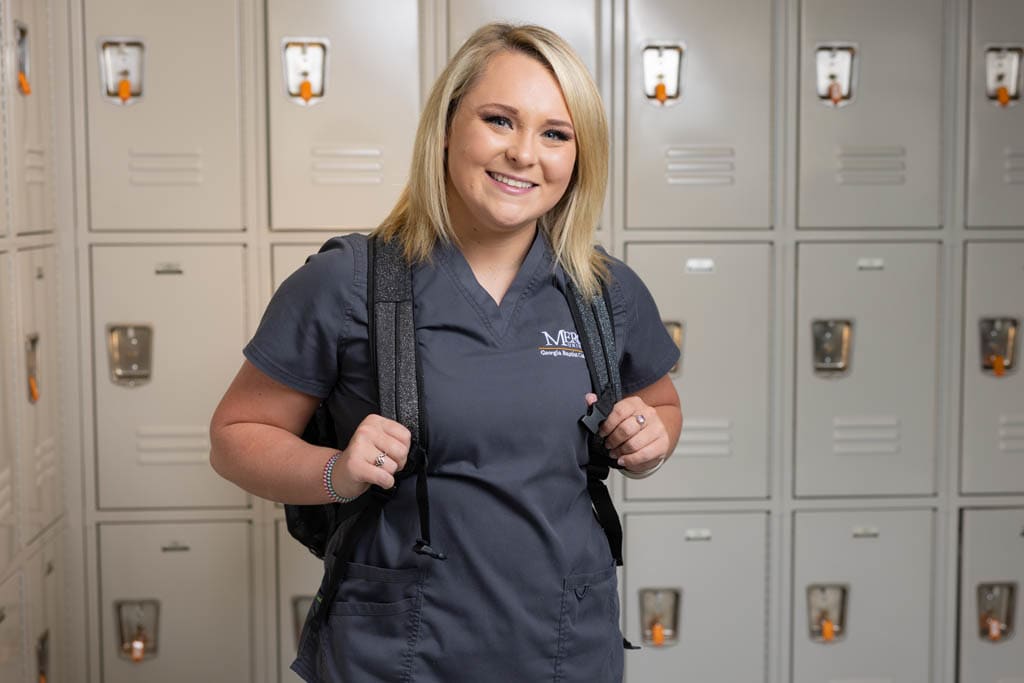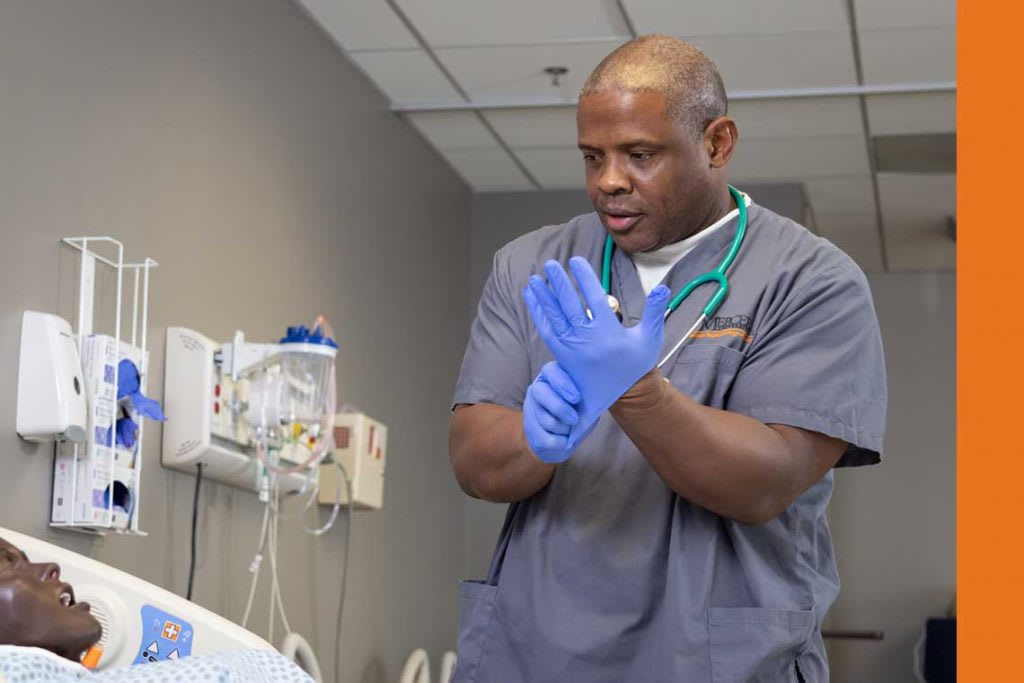Why Become a Nurse? 5 Reasons Why Nursing Might be Right for You
Each blog post is dated and contains accurate information as of that date. Certain information may have changed since the blog post publication date. If you would like to confirm the current accuracy of blog information, please visit our ABSN and BSN transfer track overview page or contact admissions at 844.347.2108.
If you’re wondering “why become a nurse?” some top reasons include the impact of nursing on patients, the variety of work environments, available growth opportunities and the fact that you can access a nursing career in just over a year when enrolled in an ABSN track like Mercer University’s.

Perhaps you feel called to the nursing profession, but have taken a different path. Maybe your inspiration to change careers came more recently, and you are interested to shift to nursing. Whatever your reason to become a nurse, it is likely you want to make a new and rewarding career a reality sooner than through pursuing a traditional four-year nursing degree program.
The good news is, if you already hold a non-nursing bachelor’s degree and meet the admission requirements, you can leverage this previous educational experience to earn a Bachelor of Science in Nursing (BSN) degree in as few as 12 months through Mercer University’s Second Degree Accelerated Bachelor of Science in Nursing (ABSN) track.
Tackling a comprehensive nursing education is challenging, especially when condensed into an accelerated timeframe. Mercer ensures that students have the instructor and faculty support necessary for success.
So why become a nurse, and why is the career field a great option? We will explore some of the top reasons to become a nurse and share how Mercer’s ABSN track prepares you for a nursing career.
1. Nurses Make a Big Impact
Few professions offer the opportunity to make a profound impact and difference in the lives of others every day. Nurses are there to comfort and care for individuals at every stage of their lives, and are consistently ranked as the most trusted professionals in the U.S. year after year. However, there is still a shortage of these valuable professionals to meet the growing need.
From big cities like Atlanta, to small rural communities, many Americans are living with chronic health conditions more than before. These range from Alzheimer’s disease, diabetes, and obesity to heart disease and cancer — the two leading causes of death in the United States, respectively.

Nearly half of the U.S. population has at least one chronic disease, and around 25% have at least two chronic conditions, according to the Centers for Disease Control and Prevention. For older Americans, the numbers are even more staggering, with more than half suffering from three or more chronic conditions.
Additionally, more than 50% of the current nursing workforce may move into retirement by 2033, contributing to the need for more qualified nurses. The Bureau of Labor Statistics estimates there will be around 203,200 registered nurse openings each year between now and 2030, meaning that the career field offers opportunity for people just now entering the profession to make a major impact.
2. Nursing Offers Variety
No two days working as a nurse are the same, making it an exciting profession. Additionally, the variety of practice and employment settings means you do not have to stay in one area your entire career. Plus, unlike many professions, nurses can find both full-time and part-time opportunities in entirely different career paths or working environments. After gaining bedside experience as a registered nurse, a few alternative nursing career paths you can consider include:
- Telehealth nursing
- Home healthcare nursing
- Military nursing
- Research nursing
- School nursing

Do you want to learn more about alternative nursing career paths? Read more about the opportunities a BSN degree makes available.
3. Nursing Is a Stable, Rewarding Career Path
Given the growing demand for nurses, the nursing job outlook is positive. While it varies by location, RNs in the U.S. earn an average median annual wage of $77,600. And while few data sources separate BSN nursing salary vs. ADN nursing salary, the additional opportunities for specialization and further education available to baccalaureate-educated RNs make it clear that they will enjoy greater career opportunities over time. This is just one of the reasons to become a nurse, but it can make a difference when evaluating different career fields.

See how the outlook for nurses in Georgia is positive for long-term career goals.
4. Nursing Offers Many Opportunities for Growth
As an RN with a BSN degree, you will have plenty of opportunities to advance your career. This degree offers the opportunity to pursue management and leadership positions in nursing, but it also lays the foundation for advanced practice registered nurse (APRN) roles.

By returning to school to earn a Master of Science in Nursing (MSN) degree — which you can complete through Mercer University — you will become eligible for additional nurse leader roles, as well as to help teach the next generation of nurses as a clinical or nurse educator. Additionally, with an MSN degree, you can also pursue APRN certification in a number of high-demand, high-paying nursing careers, including:
- Clinical nurse specialist
- Nurse anesthetist
- Nurse midwife
- Nurse practitioner
A career in nursing can take many directions, and it all starts with a BSN.
5. A Rewarding Career May Be Closer Than You Think
If you already hold a non-nursing bachelor’s degree, it may be possible to earn a BSN degree in as few as 12 months, through Mercer University’s Accelerated BSN track. The 12-month Accelerated BSN track offers a blended approach to nursing education, consisting of three components: online-based coursework, in-person skills and simulation labs, and clinical rotations within some of the top healthcare facilities throughout Metro Atlanta.

Learn more about ABSN tracks like Mercer University’s, and see how to tell whether one might be right for you.
Start Your Nursing Journey with Mercer ABSN
Why become a nurse? Nurses — especially those who hold BSN degrees — are needed now more than ever. The complexity of our healthcare system, increasing prevalence of chronic conditions, and aging population all require nurses whose knowledge extends beyond the essentials of nursing practice. Increasingly, nurses are called upon to educate and advocate for patients, to collaborate with multi-disciplinary care teams, and to treat patients mentally and physically. Meeting this need while embarking on a rewarding career path is a great choice for many people.
With Mercer’s Second Degree ABSN track, you can apply your previous non-nursing bachelor’s degree toward earning a BSN in as few as 12 months. Upon graduation you will be prepared to take the NCLEX exam to begin professional practice as a registered nurse. Take the first step toward a rewarding new career today. Fill out the form to connect with an enrollment counselor and find out if Mercer’s Accelerated BSN track is right for you.
